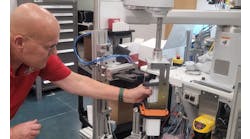This article was printed in CONTROL's July 2009 edition.
Globalization, increasing environmental compliance requirements and supply chain cost pressures are forcing more and more companies to examine sustainability and corporate social responsibility programs and solutions. For many companies, "going green" is no longer a buzzword, but an important business imperative that can lower costs and provide a competitive advantage. Manufacturing execution systems (MES) can be a crucial tool to reach that imperative.
Sustainability 101
Twenty years after the United Nations took up the challenge of sustainability, it appears that the 1987 Brundtland Commission Report on sustainability (http://www.un-documents.net/wced-ocf.htm), "Our Common Future," has become mainstream reading among leading multinational firms, such as Abbot Labs, Bristol-Myers Squibb, Dow Chemical, DuPont, GE, General Mills, Merck, Potash Corp., Suncor Energy and a whole lot more.
Of course, each company puts its own spin on what sustainability means, but it really comes down to action in the area where the environment, money and people converge. (See Figure 1)
About 10 years ago, Bristol-Myers Squibb (BMS, http://www.bms.com) conducted a company-wide environmental impact analysis. "We have followed up with targeted initiatives worldwide to reduce energy and water consumption, wastewater, non-hazardous waste, offsite hazardous waste disposal and air emissions of greenhouse gases, acid gases and other chemicals," explains Susan Voigt, BMS vice-president for environment, health and safety.
About that same time, Corporate Responsibility Officer magazine (CRO, http://www.thecro.com/) issued its first "100 Best Corporate Citizens" list. What makes this list noteworthy is that it is based entirely on publicly available information, including non-secure websites, government and regulatory sources, investment publications and non-government databases. That means the list's sources are public places accessible to anyone researching Russell 1000 companies.
In 2009 CRO awarded its "Best Corporate Citizen" top spot to Bristol-Myers Squibb. In doing so, CRO credited BMS for making strides in changing its environmental impact on the world, including improving its carbon footprint by surpassing its target of a 10% decrease in greenhouse gas emissions by 2010 and creating a U.S. Green Building Council certified biologics facility in Devens, Mass.
Innovative approach
BMS engineer Brian Chviruk says, "When Bristol-Myers Squibb committed to constructing its Devens, Mass., Large Scale Cell Culture (LCSS) biologics manufacturing facility, it also committed to the pursuit of the U.S. Green Building Councils Leadership in Energy and Environmental Design (LEED) certification (www.usgbc.org/DisplayPage.aspx?CategoryID=19 or http://tinyurl.com/ax9px), which recognizes site development, water savings, energy-efficient materials selection and indoor environmental quality."
Chviruk explained that BMS engineers viewed the company's LCSS commitment as an opportunity to implement one of the truly innovative ideas they had been discussing ever since the U.S. Food and Drug Administration (FDA) began encouraging the use of risk-based approaches to advance good manufacturing practices. Their innovative idea? Apply MES technologies to help develop a highly integrated, paperless plant designed to achieve:
- Highly automated and tightly integrated electronic production and laboratory batch records;
- Batch releases by exception; Application of a science- and risk-based approach to validation;
- Implementation of an open-office environment designed to maximize collaboration within and across functional groups; and
- Contributions to BMS' Sustainability 2010 Goals.
(Learn more about BMS' innovative use of MES at www.controlglobal.com/0906_chviruk.html)
Management in a Box
What made BMS engineers think MES could help them achieve their sustainability goals? Probably the evolving and flexible nature of this collection of applications described in the past by some wags as an acronym in search of a market. That snark is over time losing some of its bite.
The term MES first appeared in the early 90s to define thinly integrated point solutions for production work order and inventory tracking with some quality and scheduling capabilities. Since then, work by several organizations have evolved early MES models in several directions and introduced new terms, however MES remains the term of choice.
Layered between business systems and plant floor control systems MES's primary purpose is to help manage production scheduling and sequencing, but 21st -century MES is not a single application. Today's MES solutions are assembled from robust, highly integrated software modules designed to address the needs of four key production management areas: quality and compliance, information integration, operational optimization and resource management. (See Figure 2) It's not hard to see how a robust MES system could support BMS' sustainability goals.
Quality and compliance is where MES modules assemble documentation that helps ensure that production operations and product quality activities have been performed within their defined specifications and procedures. Producing highly complex products in a highly regulated industry can produce mountains of documentation. When significant amounts of this documentation are handwritten, missing or illegible information and signatures frequently delays a product's release. Even after handwriting problems are resolved, the sheer volume and quality of documentation can become a hindrance to its usability.
When examining MES solutions to help manage quality and compliance activities pay close attention to:
- Batch record management features that support storage and archiving of master batch records in a way that allows the effective management of post-production processes, such as tracing the flow of raw materials into production lots or individual serial numbers;
- Document control tools designed to help manage the creation, approval, distribution and archiving of controlled documents?
- Federated search engines with the capability of supporting simultaneous, real-time searches of multiple, diverse and distributed data sources and then assembling those data into a single results page;
- Security and audit capabilities that ensure application security is accompanied by a comprehensive audit trail for electronic records and signatures (i.e., FDA 21CFR Part 11).
And don't believe for a moment that MES solutions only provide benefits to highly automated production operations. Modern MES solutions are a great way to deliver up-to-date manual work instructions that are accompanied by a secure track-and-trace audit trail that helps ensure manual work instructions are properly completed.
Integrated information is about placing the right information in the right people's hands at the right time. Integration of information should consolidate real-time plant floor data, such as process control, manufacturing operations, ERP, laboratory information, and maintenance information and scheduling transparently. Transparently integrated information permits authorized personnel to make timely operational decisions, accurately communicate production status and release batch lots by exception.
When examining integrated information MES solutions pay close attention to:
- Message broker capabilities designed to provide configurable interfaces and standardized exchanges of real-time information. Seek message brokering capabilities that use the service-oriented architecture method of allowing different applications using different operating systems and programming languages to exchange data.
- Operational dashboards that permit authorized personnel to subscribe to multiple data sources and that employ a configurable workspace to consolidate data into useful presentations.
- Process analysis tools designed to mine and analyze data in a variety of ways, thus helping authorized personnel expose process improvement opportunities.
Operations optimization is about ensuring that production operations conform to approved/validated workflow processes. Production operations include many workflow processes that are performed and coordinated by plant personnel. Assuring that production operations conform to the specified workflow is required for high-quality and efficient production. Operations that are critical to optimize operations include order management, coordinating manual procedures with automated controls, in-process material management, equipment cleaning and scheduling, product sampling and production documentation.
When examining MES operational optimization solutions pay close attention to:
- Electronic workflow that is tightly integrated with document control. Seek solutions that deliver the correct and most up-to-date document to the correct person at the time they need it. Electronic workflow also should perform real-time permissive checks, such as verifying material and equipment compatibility or confirming an operator's training and authority.
- Order management tools that provide scalability and oversight for all production orders based on real-time needs. Order management should also integrate ERP production orders with plant floor systems, as well as provide order management for facilities lacking an ERP system.
- Recipe authoring capabilities that provide flexibility and capability to create a mix of manual and automated workflow orders and recipes. Seek a modular drag-and-drop recipe development method similar to that used by Bristol-Myers Squibb at its Devens LCSS facility.
- Scheduler tools capable of transforming high-level production plans into detailed and executable orders. Scheduler tools should be sufficiently robust to monitor order execution and adjust to changing plant-floor conditions.
Resource management of people, materials and equipment is an important part of an efficient production facility. Scheduling and tracking equipment usage can increase capacity. Optimizing material usage and eliminating the use of outdated material can reduce waste and rework and helps ensure production meets targeted specifications and yields. Improving operator productivity by guiding manual processes and enabling access to support documents also contributes to improvements in production efficiency and performance. Ensuring that personnel have the qualifications and authority to perform specific activities can reduce costly mistakes and assure regulatory compliance.
When examining resource management MES solutions pay close attention to:
- Equipment tracking solutions capable of monitoring the properties (i.e., availability, authorized usage, material compatibility, maintenance, etc.) of any type of equipment and ensures that a piece of equipment is both suited for and in the required state before releasing it for use;
- Material management tools that compliment ERP inventory systems by tacking raw material inventories, material movements and final product inventories. Material management tools should also help manage material purchasing, receiving, storage and shipping;
- Personnel management tools that can help ensure that personnel have received the necessary training for assigned activities, such as the authority to note and sign-off on quality related documentation;
- Weighing and dispensing modules that are designed to help operators accurately move and track material from bulk containment into production. Expect these solutions to include weigh-scale integration, bar-code scanning and printing, embedded material health and safety information, embedded approved operating procedures and integration with ERP systems.
The "Sustainability 101" (Figure 3) graphic indicated sustainability's sweet-spot and we've discussed the role and features of MES but eventually someone will ask if MES and sustainability can really have a positive impact on a company's top and bottom line.
Top & Bottom Lines
Aberdeen Group's (http://www.aberdeen.com) March 2008 report, "Building a Green Supply Chain," provides an in-depth and comprehensive look into the "going green" imperative business executives are embracing.
According to Aberdeen Group's report, the business case for green initiatives hinges on a company's ability to impact both top and bottom lines in four key areas:
- Transportation and logistics,
- Energy,
- Operations and facilities,
- Supply.
MES solutions can help in each of these areas. For example, in the area of transportation and logistics, MES can provide accurate, real-time updates of work-in-process. When a finished product is waiting to be released for shipment, MES document management capabilities eliminate last-minute scrambles to decipher illegible production comments or get that one last signature.
MES also can play a significant role in reducing energy costs. One such example occurs in the food and drug industry sectors. In these processing facilities clean-in-place (CIP) and steam-in-place (SIP) activities are required of vessels and piping between uses. However, if a piece of equipment remains idle for too long after it has been cleaned, it must be re-cleaned before it can be used. MES solutions can track CIP/SIP activities and can route production to equipment that is nearing its CIP/SIP expiration period automatically, thereby managing both production schedules and energy costs.
If MES has a sweet spot, it's the operations and facility management portion of every production facility. Production includes many workflow processes that are performed and/or coordinated by plant personnel. Assuring production operations conform to the specified workflow is required for high-quality and efficient production. Operations that are critical to optimize production include order management, coordinating manual procedures with process control, in-process material management, equipment cleaning and scheduling, product sampling and manufacturing documentation.
Knowledge management/retention is another place where MES can shine. We've all heard the retiring workforce stories. MES solutions can help capture the proverbial "best operator on their best day" scenarios before that expertise retires.
Supply was the last area identified in the Aberdeen Group report and again, MES offers assistance. Production can't begin until the raw materials are available in suitable quantities and of sufficient quality. MES' information integration capabilities can be invaluable in providing real-time raw material availability to the plant floor. MES' weighing and dispensing capabilities also help ensure raw materials are "reserved" for a specific recipe and production lot.
A recurring recommendation in the Aberdeen Group report was the use of technology to provide the tools and visibility necessary to effectively identify and manage production processes. Though not specifically identified in the Aberdeen Group report, MES certainly qualifies as one of those technologies.
Investing and Delivering
BMS is not the only big company seeing success in its sustainability efforts. For more than 400 straight quarters (100+ years) GE (http://www.ge.com) has paid its stockholders a dividend, thus GE executives fully understand how the success of new initiatives are measured. That's why in 2005 when GE began aligning its strategic business priorities with the company's sustainability priorities business leaders and investors worldwide paid close attention.
The success of that initiative was acknowledged this past April when GE received the Ceres-ACCS (http://www.ceres.org) Sustainability Reporting Award.
Business leaders at Bristol-Myers Squibb and GE are convinced that sustainability investments are good for their companies, its investors, the community, and the planet. For BMS and GE "going green" has become a business imperative, and MES technologies are playing a significant role.
About the author: Dave Harrold, is president and co-founder of AFAB Group. He has more than 40 years of process control experience. He may be reached at [email protected].
Latest from Asset Management

Leaders relevant to this article:






